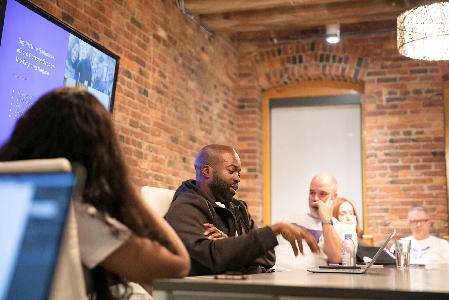A recent study conducted by PricewaterhouseCoopers (PwC) U.K. found that 83 percent of female students in the U.K. find it impossible to name a female role model that inspires them to pursue a career in technology.
While disappointing, it’s not terribly surprising.
I’m incredibly honored to be the first female managing partner in the 120-year history of PwC’s Philadelphia office. Since becoming partner, I have committed to advance inclusion in our office while making it a priority to better the overall landscape for women in tech. The future of my 12-year-old daughter’s career experience will be much different than my own.
According to the National Science Foundation, women make up nearly half of the general U.S. workforce yet only 29 percent hold a job in STEM. At PwC, a company that has made digital upskilling an essential priority of the employee experience, there is a focus on making the workplaces of tomorrow more inclusive.
When my career at PwC began 30 years ago, there wasn’t a single female partner in our Philadelphia office. Across industries, women in leadership positions — especially on corporate boards– were often the exception and not the norm. There were many instances when I found myself to be the only woman in the room. Much has changed since at PwC, and I am especially proud to be working at a firm where 30 percent of our U.S. leadership team is now made up of women.
Women need to be in leadership positions in order to mentor and influence young women at all career levels, board positions and in all industries, including those with fewer women, such as tech. Moreover, companies with structured mentorship programs are seeing strong interest and participation from the workforce.
Currently, female representation on U.S. corporate boards currently stands at only 22 percent. The percentage has not shifted at the national level in recent years and change has been slow locally as well, in Philadelphia. According to a study issued last year by The Forum of Executive Women in collaboration with PwC, the number of women that hold seats on Philadelphia public company boards has only increased 1 percent from 2016 to 2017.
So where do we start?
We know that in order to impact women of all career levels and curiosities, more women need to be seen in leadership positions. We need to address that initial stat above. Another PwC study found that 82 percent of women are confident in their ability to fulfill their career aspirations and 77 percent feel confident in their ability to lead. Mentorship is a significant method toward removing some of the hurdles women face in their career progression. While we practice mentorship through a number of programs internally at PwC, we’re finding ways to enable mentorship externally as well.
The PwC Charitable Foundation provided a grant to support the Girls Who Code Summer Immersion Program in both Philadelphia and Washington D.C. this summer. PwC will host the seven-week introductory computer science program, which allows participants not only to learn more about computer science and career opportunities in the tech industry, but also welcomes them into a network of change-makers that are using technology to solve important problems. This is one way PwC is helping to make an impact.
This aligns with PwC’s broader commitment to digitally upskill diverse students for the future workforce, and the $320 million commitment to inspire 10 million students and train 100,000 teachers and guidance counselors by 2021 through its Access Your Potential initiative.
Equality is one of the most important issues businesses face today and we are addressing it head-on at PwC. When we deliver initiatives dedicated to improving inclusion in the workplace, we can power innovation and increase employee retention. Take it from me; 30 years at PwC and I’m still learning. At the end of the day, I’ve found that when we leaders encourage our teams to bring diversity of thought and experience to the table, we perform better work.
I will leave you with this: A strong commitment to inclusion drives our collective activities, impact, and our broader contribution to the marketplace. So here’s to an empowered future powered by the future generations of young women leaders.

This is a sponsored guest post by PricewaterhouseCoopers.
Before you go...
Please consider supporting Technical.ly to keep our independent journalism strong. Unlike most business-focused media outlets, we don’t have a paywall. Instead, we count on your personal and organizational support.
3 ways to support our work:- Contribute to the Journalism Fund. Charitable giving ensures our information remains free and accessible for residents to discover workforce programs and entrepreneurship pathways. This includes philanthropic grants and individual tax-deductible donations from readers like you.
- Use our Preferred Partners. Our directory of vetted providers offers high-quality recommendations for services our readers need, and each referral supports our journalism.
- Use our services. If you need entrepreneurs and tech leaders to buy your services, are seeking technologists to hire or want more professionals to know about your ecosystem, Technical.ly has the biggest and most engaged audience in the mid-Atlantic. We help companies tell their stories and answer big questions to meet and serve our community.
Join our growing Slack community
Join 5,000 tech professionals and entrepreneurs in our community Slack today!




